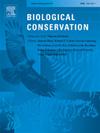恢复狂野的东部:预测公众对美洲狮和红狼在美国东部重新引入的支持
IF 4.4
1区 环境科学与生态学
Q1 BIODIVERSITY CONSERVATION
引用次数: 0
摘要
将大型食肉动物恢复到人类主导的景观中仍然存在生态和社会争议,尽管在可能共存的情况下重新引入可能会带来重要的好处。然而,在美国东部重新引入美洲狮(Puma concolor)和红狼(Canis rufus)的努力面临着重大挑战,主要是由于人类造成的死亡和反对。我们采用风险接受模型和结构方程模型来研究公众支持放归的社会心理驱动因素。调查数据来自美国东部的美洲狮(n = 2665)和红狼(n = 3825)。对于这两个物种来说,支持与感知到的个人和社会利益正相关,与感知到的社会风险负相关。感知到的个人风险显著降低了对美洲狮的支持,但对红狼没有影响。对每个物种的积极影响通过塑造风险和利益观念强烈影响支持。对风险的感知控制也降低了对风险的认知,提高了支持度。这些发现突出了特定物种的关注,并为更有效的推广、冲突缓解和食肉动物恢复计划提供了途径。本文章由计算机程序翻译,如有差异,请以英文原文为准。
Restoring the wild east: Predicting public support for cougar and red wolf reintroduction in the eastern United States
Restoring large carnivores to human-dominated landscapes remains ecologically and socially contentious, though reintroduction may offer important benefits where coexistence is possible. Yet, efforts to reintroduce cougars (Puma concolor) and red wolves (Canis rufus) in the Eastern U.S. face major challenges, largely due to human-caused mortality and opposition. We employed the hazard acceptance model and structural equation modeling to investigate the socio-psychological drivers of public support for reintroduction. Survey data were collected from residents of the Eastern U.S. for cougars (n = 2665) and red wolves (n = 3825). For both species, support was positively associated with perceived personal and societal benefits and negatively associated with perceived societal risks. Perceived personal risk significantly reduced support for cougars, but had no effect for red wolves. Positive affect toward each species strongly influenced support by shaping risk and benefit perceptions. Perceived control over risks also reduced risk perceptions and boosted support. These findings highlight species-specific concerns and suggest pathways for more effective outreach, conflict mitigation, and carnivore recovery planning.
求助全文
通过发布文献求助,成功后即可免费获取论文全文。
去求助
来源期刊

Biological Conservation
环境科学-环境科学
CiteScore
10.20
自引率
3.40%
发文量
295
审稿时长
61 days
期刊介绍:
Biological Conservation is an international leading journal in the discipline of conservation biology. The journal publishes articles spanning a diverse range of fields that contribute to the biological, sociological, and economic dimensions of conservation and natural resource management. The primary aim of Biological Conservation is the publication of high-quality papers that advance the science and practice of conservation, or which demonstrate the application of conservation principles for natural resource management and policy. Therefore it will be of interest to a broad international readership.
 求助内容:
求助内容: 应助结果提醒方式:
应助结果提醒方式:


